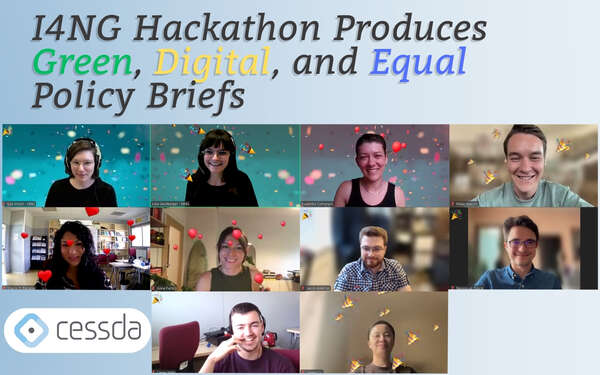
Second Infra4NextGen Hackathon Produces Green, Digital, and Equal Policy Briefs
Earlier this year, the first two waves of the CROss-National Online Survey 3 (CRONOS-3) panel data were made available via the European Social Survey (ESS) data portal. At the recent Infra4NextGen (I4NG) Hackathon, participants used that data to create policy briefs while competing for a share of €4,000.
The event took place over several days, from Wednesday 11 to Monday 16 June. Participants were tasked with creating policy briefs on a range of topics, including attitudes towards economic inequality, public support for policies combatting climate change, and digital skills such as fact-checking.
Project participants Julia Geistberger and Lisa Hirsch from AUSSDA - the Austrian Social Science Data Archive - led the event for I4NG. They both found the experience fun and exciting, and were impressed with the final outcome.
“It went very well. The participants produced results that were reusable, meaningful, and, perhaps because some of them had previously participated in our hackathon on data visualisation, they were also pretty!” said Lisa.
“It was great to work with such a motivated group, producing very meaningful results,” added Julia.
The winners were chosen by a jury composed of members from City, University of London, and Cardiff University. Jury member Dr. Ruxandra Comanaru (City, University of London) expressed how impressed the jury was with the results:
“It was great to see what can be done with the data, and how well it was connected with other data sources.”
Three winners chosen
Three submissions were selected from the categories “Make it Green,” “Make it Digital,” and “Make it Equal.”
From “Make it Green,” the winning paper was “Bridging the Climate Commitment Gap: Securing Citizen Support for Climate Policy” by Sharon S. Baltazar and Carles Vañó-Agulló. Their policy brief provided evidence-based guidance for increasing public support for climate policies across nine European countries.
From “Make it Digital,” Jakub Adamski and Remigiusz Żulicki placed first with the paper “Europeans and False Online Information” and received a special recognition prize for the relevance of their topic. Their paper focused on what factors influence Europeans’ confidence in digital fact-checking and what policy recommendations can strengthen citizens’ fact-checking skills across Europe.
From “Make it Equal,” the winning paper was “Mind the Gap: Why Inequality Perceptions Matter for Social Policy” by Anna Fuchs and Niklas Ippsich. It received a special recognition prize for its use of visualisations. The paper explores why perceptions of inequality matter for social policy, showing how higher perceived income inequality is associated with stronger support for social assistance for the poor in most countries.
Positive feedback from participants
Feedback from the participants was also positive. From the organisation and the theme to the challenge itself and the chance to collaborate, attendees had plenty of good things to say about the hackathon. As one participant put it:
“I congratulate you on a great event, can’t wait for the next one! 🙂”